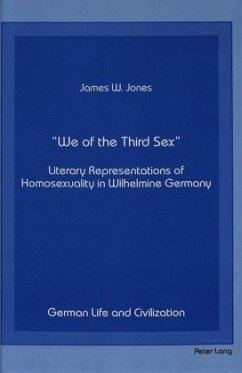This study traces the influence which the medical model of homosexuality, conceived and formulated largely by German physicians, exerted upon works of prose fiction and dramas written between the late 1880s and 1914. This "Third Sex", as it was named, inhabited a space created between the heterosexual male and female, and its members rapidly proliferated in literary works. Combining historical, narrative and feminist approaches, the author analyzes over three dozen works in terms of both their social contexts and the aesthetic strategies they employ in presenting homosexual characters. The writers studied include: Frank Wedekind, Elizabeth Dauthendey, Robert Musil, Maria Janitschek, Thomas Mann and John Henry Mackay. Jones' readings of these texts reveal that these depictions evolved from a rather exact mirroring of the medical model for homosexuality into a more varied presentation in which we find the genesis of a specifically German literary discourse on homosexualities.
"James W.Jones's study is understandably very badly needed, and long overdue, offering us the only book-length, English-language, scholarly study of late nineteenth and early twentieth-century German gay belles lettres do date. ... It is a keystone to future German gay literary scholarship." (Dr. Les K. Wright, Lesbian and Gay Newsletter)
"Professor Jones is to be congratulated on uncovering much eccentric material, as well as arguing objectively and without parti pris." (Raymond Furness, New German Studies)
"It is a first-rate piece of work. Jones is all-emcompassing in his selcetion of sources, wheter wee-known (such as Wedekind) or unknown (such as Maria Eichhorn). I commend Jost Hermand for including this volume in his series on German Life and Civilization and recommend it to all readers." (Sander L. Gilman, Monatshefte)
"Seine øJones! voluminöse Studie erstellt für den Zeitraum 1900-1933 eine unentbehrliche Materialgrundlage zukünftiger literarischer Homostudien." (Klaus Müller, Forum)
"Professor Jones is to be congratulated on uncovering much eccentric material, as well as arguing objectively and without parti pris." (Raymond Furness, New German Studies)
"It is a first-rate piece of work. Jones is all-emcompassing in his selcetion of sources, wheter wee-known (such as Wedekind) or unknown (such as Maria Eichhorn). I commend Jost Hermand for including this volume in his series on German Life and Civilization and recommend it to all readers." (Sander L. Gilman, Monatshefte)
"Seine øJones! voluminöse Studie erstellt für den Zeitraum 1900-1933 eine unentbehrliche Materialgrundlage zukünftiger literarischer Homostudien." (Klaus Müller, Forum)

